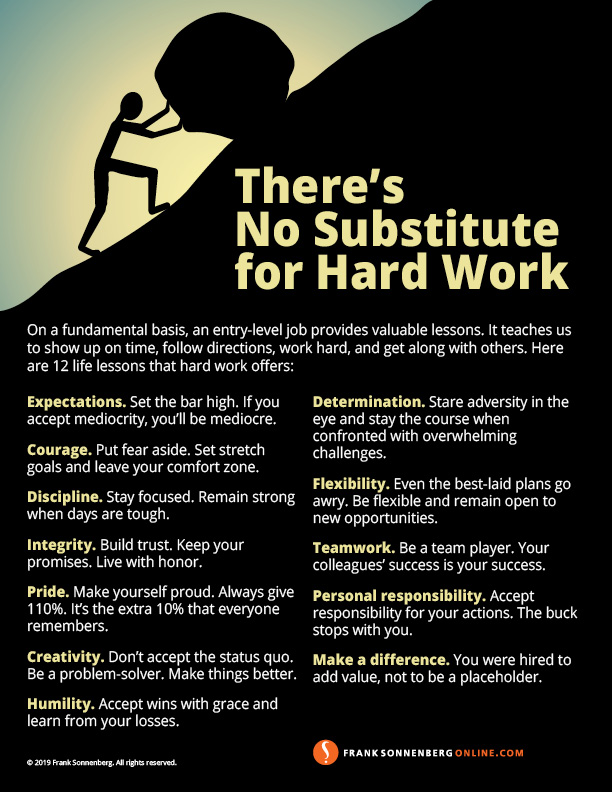
There’s No Substitute for Hard Work
There’s no substitute for hard work. It builds character, contributes to success, provides a living, and promotes happiness. On a fundamental basis, an entry-level job provides valuable lessons. It teaches us to show up on time, follow directions, work hard, and get along with others. Here are 12 life lessons that hard work offers:
Expectations. Set the bar high. If you accept mediocrity, you’ll be mediocre.
Courage. Put fear aside. Set stretch goals and leave your comfort zone.
Discipline. Stay focused. Remain strong when days are tough.
Integrity. Build trust. Keep your promises. Live with honor.
Pride. Make yourself proud. Always give 110%. It’s the extra 10% that everyone remembers.
Creativity. Don’t accept the status quo. Be a problem-solver. Make things better.
Humility. Accept wins with grace and learn from your losses.
Determination. Stare adversity in the eye and stay the course when confronted with overwhelming challenges.
Flexibility. Even the best-laid plans go awry. Be flexible and remain open to new opportunities.
Teamwork. Be a team player. Your colleagues’ success is your success.
Personal responsibility. Accept responsibility for your actions. The buck stops with you.
Make a difference. You were hired to add value, not to be a placeholder.
What Are Other Benefits of Hard Work?
Please leave a comment and tell us what you think or share it with someone who can benefit from the information.
Additional Reading:
What Can Sports Teach You About the Game of Life?
The Power of a Positive Attitude
You Get What You Expect
If You’re Not Proud, You’re Not Done
If you like this article, subscribe to our blog so that you don’t miss a single post. Get future posts by RSS feed, email or Facebook. It’s FREE.





Hi Frank, what an excellent post regarding the value of hard work. I especially like the 12 life lessons that you included here. I do have some questions though. I hope it’s okay to ask here. And this is a bit long so I apologise in advance.
First a brief background.
I’m a recovering perfectionist who grew up on a steady diet of “you need to work hard”, “if it’s too easy, then you’re not doing it right” and “you can only succeed if you sweat blood and tears”.
Whilst growing up, this is what I expected to happen and it was compounded by my perfectionism, which meant that my expectations (of others and of myself) are so high that practically no one can meet them.
Now, I’m learning to lower the bars a little bit and I’ve also realised the value of working smart as opposed to working hard.
I also now have a three-year-old son and I’m struggling with this very topic.
How do I balance working hard with working smart or setting high expectations but not expecting them to be perfect?
And even more importantly, how do I teach a young boy something I don’t even fully grasp?
Obviously, I would like him to learn the 12 life lessons you’ve covered here but at the same time, it would kill me if I ever found out that he talks to himself the way I talk to myself when I don’t achieve the high standards I’ve set.
It’s such a conundrum for me.
Anyway, thanks very much for writing this really timely post, Frank. I hope to read your insights.
Best,
Jade
Hi Jade
Your comment came at a perfect time. My post yesterday addresses the high cost of perfectionism. Please take a look when you have a moment and let me know if you have additional questions. Here’s the link for your convenience.
https://www.franksonnenbergonline.com/blog/when-youre-a-perfectionist-your-work-is-never-done/
Thanks for taking the time to write.
Best,
Frank
Hi Frank, great post about the value of hard work, though I would add that the ability to get along with others doesn’t end at entry level! I have spent many years in the corporate world and I would say that the higher up a person goes in any organization the more important it is that they are seen to be ” team players” for all the right reasons as others look to leaders to set the example.
Kind regards,
Camilla
You make an important point, Camilla
When we begin our career, we’re measured by our personal productivity. As we rise up the ladder we’re measured by the productivity of the people we lead.
Some folks believe that command and control is the best way to achieve that end. Real leaders win support by earning trust and respect. This is achieved through powerful ideas, personal expertise, and impeccable integrity rather than through their position or by “pulling rank.”
Thanks for taking the time to write.
Best,
Frank